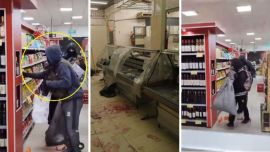Close to 30 people were arrested in Argentina over the long weekend following looting at shops in the provinces of Cordoba and Mendoza.
Officials from the national government complained Monday that the “criminal acts” were conspiratorial in tone and designed to spark confusion and insecurity fears amid the presidential election campaign.
"These are criminal acts to deliver more confusion and generate conflict. There is nothing else, they have not been looting, they seek to provoke an action to attract attention," claimed Security Minister Aníbal Fernández in a radio interview.
"Someone is encouraging it, looking for an alternative that has nothing to do with looting; it is a vocation to generate conflict," he declared.
"There have been arrests by the police and judicial authorities, and many of the organisers are citizens who had previous convictions. We don't see in this a social reaction, but rather acts that deserve the full weight of the law," added Cabinet Chief Agustín Rossi on Tuesday.
At least 20 people were arrested on Tuesday in Córdoba for the looting of at least 12 shops, provincial police said in a statement. In Mendoza, seven were detained, with unrest also reported in Neuquén. In the nation’s capital, Buenos Aires City, an attempt to loot shops in Barrio 1-11-14, Bajo Flores, on Monday night was prevented by local residents.
Those incidents came less than 24 hours after a large group of people attempted to loot a supermarket in Río Cuarto, Córdoba Province. At least 10 people were arrested for the incident, seven of whom are minors.
Argentina is going through an acute economic crisis, with inflation running at more than 113 percent annually and with more than 40 percent of the population living in poverty.
Looting is a sensitive topic, heavily associated with the unrest in December 2001 that gripped the country during a sweeping economic, social and political crisis. Similar behaviour was seen in 1989, in the midst of hyperinflation.
– TIMES/AFP




















Comments